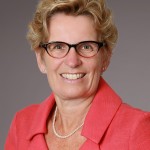
New Liberal leader looks to wheel and deal with the NDP for survival.
by Geoffrey Stevens
There’s an old saying in politics that new leaders are never stronger than on the day they take over. If they are going to make changes, they should make them quickly, while the goodwill lasts and before their opponents get dug in.
Kathleen Wynne understands. Fresh from her victory at the Ontario Liberal leadership convention, she announced she will recall the Legislature, prorogued since last fall, on February 19. Between now and then, she will appoint a cabinet, prepare a throne speech and meet with the opposition party leaders in the hope of winning their cooperation to avoid an election this spring.
That done, she will have to tackle some of the detritus left behind by Dalton McGuinty – the Ornge Ambulance and hydro-plant spending scandals; a provincial deficit now estimated at $12 billion this year; and a poisoned relationship between the provincial government and organized labour, especially the teachers and the other public sector unions. She has to do all this with a minority in the Legislature where at least some of her opponents hunger for an early opportunity to bring her down.
The next six weeks should give Ontarians a reasonably clear picture of what to expect from the Wynne government. They should also reveal where on the political spectrum she intends to position her party.
Neither Kathleen Wynne nor Andrea Horwath wants an election any time soon. As long as she can extract enough goodies at strategic intervals, Horwath will prop up the Liberals.
Wynne’s dilemma can be seen in a poll published on the eve of the convention. It put the Liberals in third place, about eight percentage points behind the first-place New Democrats and five points behind the Tories.
She knows three things. First, election-weary Ontario voters do not want another trip to the polls. Second, they want politicians to tone down the rhetoric and get back to work. Third, the route to avoid an election and to get the Legislature back to work goes through the NDP.
Conservative leader Tim Hudak, it is assumed, would trade his grandmother for a ticket to the polls; he knows the next election may be his last chance at the brass ring. NDP leader Andrea Horwath and Wynne come from a similar direction. Neither, for her own reasons, wants an election any time soon. As long as she can extract enough goodies at strategic intervals, Horwath will prop up the Liberals, perhaps through the end of this year, if not longer. For her part, Wynne made it clear in her speeches at the convention and in her press conference afterward that she is prepared to deal.
To my mind, the speeches made by Wynne and her principal rival, Sandra Pupatello, before the voting on Saturday were most interesting parts of the convention. Pupatello, the perceived front-runner, made a fine, but traditional, political speech, impassioned and partisan; no one doubted that she meant it when she said she would bring the opposition parties to their knees.
Wynne seemed more conciliatory, more disposed than Pupatello to work with the opposition. Wynne’s was one of the best convention speeches I have heard in years. It had class, conviction and courage, especially when she took on the “elephant in the room” – the issue of her lesbianism. She was absolutely convincing.
Her words may have alienated some skittish delegates, but I think her powerful candor made it virtually impossible for moderate delegates who had been supporting Charles Sousa and Gerard Kennedy not to move to Wynne on the final ballot.
Now, Wynne has a chance to turn her Liberals into a progressive presence on the provincial scene. If she succeeds, the NDP will be the loser.
© Copyright 2013 Geoffrey Stevens, All rights Reserved. Written For: StraightGoods.caOne Response to “Kathleen Wynne: class, conviction and courage”
Sorry, the comment form is closed at this time.

 Cambridge resident Geoffrey Stevens, an author and former Ottawa columnist and managing editor of the Globe and Mail, teaches political science at Wilfrid Laurier University and the University of Guelph. He welcomes comments at the address below. This article appeared in the Waterloo Region Record and the Guelph Mercury.
Cambridge resident Geoffrey Stevens, an author and former Ottawa columnist and managing editor of the Globe and Mail, teaches political science at Wilfrid Laurier University and the University of Guelph. He welcomes comments at the address below. This article appeared in the Waterloo Region Record and the Guelph Mercury.
I disagree with Mr Stevens. Wynne is a classic Liberal who talks out of one side of her mouth. She voted for bill 115 and has refused to repair the damage done by restarting the process of negotiation in a principled and democractic fashion. She has refused to investigate the multi million gas plant scandal despite being present at the cabinet table when the abuses of power took place. Steven's may be glamoured by Wynne's authentic convention speech but it is not becoming of a distinguished columnist and professor of political science to "gush" like a school girl over the premier designate. While it takes courage for anyone to enter public life, Wynne is no saint and has been party to a variety of abuses of power as a member of Dalton's inner circle. Some objective scholarship might balance this article which appears to indicate that perhaps Stevens is the latest member of Wynne's transition team or at best a glofied cheerleader.